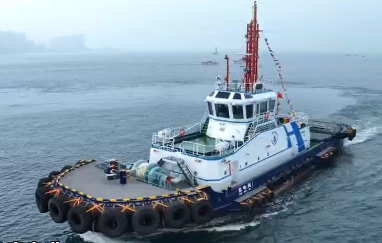Foreign firms deepen roots, strive for localization

A coordinate measuring machine scans a car model in the exhibition hall of a smart industrial park in Qingdao on May 16. LIU CHUAN/FOR CHINA DAILY
"From site selection to research and development, local authorities have provided unwavering support," said Zhan Yanan, vice-president of the business operations group of Hexagon Manufacturing Intelligence (Qingdao).
Amid geopolitical shifts, MNCs are adopting local strategies to mitigate risks.
"Some of our production chains of semiconductors have been influenced by international trade conflicts. We are now adopting local-for-local strategies to circumvent trade barriers," said Zeng of Edwards.
"By adopting local sources, local research and development and local production, we can prevent negative impacts from factors such as tariffs and trade conflicts," he said.
Hexagon has also localized R&D facilities and intellectual properties for core software and hardware, ensuring supply chain security.
"Shandong has consistently advanced industrial restructuring and accelerated the shift from old to new growth drivers, while increasing investment in emerging industries and high-tech sectors," said Zhang of the provincial commerce department.
Concurrently, multinational corporations have transitioned from market "entry" to full "integration", leveraging localized innovation initiatives to embed themselves deeply into Shandong's development, he said.
"Shandong and MNCs are writing a success story of growing together," said Zhang.
MNCs leverage the province to deeply integrate with China's robust domestic market while actively accessing international markets. Meanwhile, MNCs are not just investors — they also help upgrade the industrial structure in Shandong.
AstraZeneca's arrival filled the gap in transnational pharmaceutical manufacturing, while firms like Henkel, Hyundai, and HP have spurred clusters in new materials, autos and IT.
The 6th Qingdao Multinationals Summit scheduled to be held in June will focus on global industrial transformation trends, new investment patterns of multinational corporations, and Shandong's competitive edges in industrial investment promotion.
"The summit will feature events centering on AI, low-altitude economy, and silver economy, further integrating global players into China's innovation landscape," said Cai Peian, deputy director of the secretariat of the Qingdao Multinationals Summit, which serves as a permanent institution of the QMS.
Since its inception in 2019, the QMS has become China's first high-level platform exclusively tailored for MNCs. The first five editions attracted 421 Fortune 500 companies and 967 industry leaders, culminating in 592 signed projects with a total investment of $69.8 billion. And over 95 percent of these signed projects have reached operational phase.
The QMS secretariat has upgraded its services of QMS from a "three-day event" to year-round support through its full-cycle service model covering organizing matchmaking before the event, negotiations during the summit and follow-ups after the event.
"For example, for projects signed during the QMS, we provide follow-up support to facilitate implementation and assistance in resolving operational challenges," said Cai.
In 2024 alone, the secretariat facilitated the launch of over 200 projects. It also organized more than 20 events of MNCs touring Shandong last year, facilitating on-site inspections of industrial parks, matchmaking sessions with local enterprises and government roundtables.
"In the lead-up to this year's QMS, we have collected over 3,300 investment project leads from across China and delivered them to multinational corporations," said Cai.
As China accelerates new quality productive forces, the country remains not just a market, but a strategic partner for the future, said Zhan of Hexagon.









 Play
Play  Play
Play